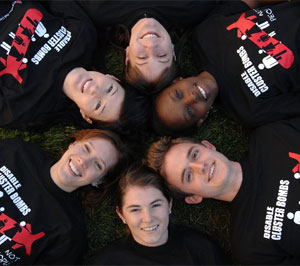 |
| Members of Even Wars Have Limits include Theresa Schiewe (at top and moving clockwise) Gaju Karekezi, Nick Aikins, Hilary Young, Kiki Wood, Erin Grinnell. (Danny Abriel Photo) |
Even Wars Have Limits (EWHL) is a group of volunteers comprised of AVæ„¿÷≤ø, Kings and Saint Mary‚Äôs students and affiliated with the Red Cross that has chosen to educate high school students and the greater community through workshops on humanitarian issues and events such as the Geneva Monologues.
“Our group is comprised of eight very eager and enthusiastic volunteers and a representative from the Red Cross,” says King's student Kiki Wood.
The group is currently gearing up for the Geneva Monologues, scheduled to take place Wednesday, Nov. 5 at the Ouro Preto Cafe on University Avenue.
“All the monologues are written by survivors of war.” says Ms. Wood. Discussions will take place after the monologues to encourage the community members to become more involved with these projects.
|
‚ÄúHalifax is such a great place to do something like this,‚Äù remarks Ms Wood, in the Contemporary Studies Programme.¬Ý‚ÄúPeople here just are so enthusiastic to take action on these issues.‚Äù
Groups have been formed at thigh schools where members of EWHL have conducted workshops in reaction to the various subjects they talk about; high school students, too, are also trying to make a difference.
“It’s really rewarding to see youth take action after seeing one of our presentations,” says Ms. Wood. She has similar hopes for the Geneva Monologues.
EWHL is found in many countries around the world and there are several small divisions of it in Canada. New members are always welcome.
LINK:
Did you know?
|
